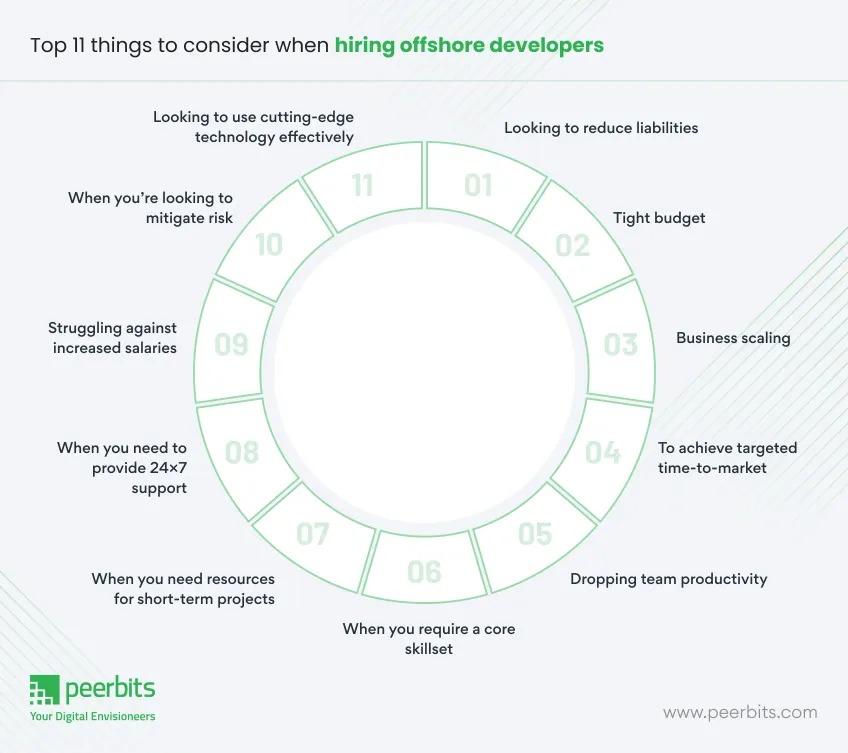Hiring offshore developers has become a strategic move for many IT companies worldwide. The time to market for any product that previously used to take 6-8 months has now been reduced to 1-3 months with advanced tech and expert teams.
To keep up with such a competitive pace of production and innovation, in-house development is not viable enough.
On top of that, scalability, specialized expertise, and cost efficiency have made outsourcing an appealing option to a larger industry. Around 50% of executives already use outsourcing for front office tasks, and 70% are planning to increase investment in third-party outsourcing based on a Deloitte Global Survey.
To add more ease, the rise of advanced communication tools and project management platforms has simplified collaboration with offshore teams. Businesses now find it easier to bridge time zones and manage remote workflows effectively, making offshore developer hiring a smart strategy.
But the decision to hire dedicated developers isn’t always straightforward. Knowing why, when, and when not to hire offshore developers is essential.
Let’s explore these options in detail so you can make an informed decision based on your business needs.
Why hire offshore developers?
A common concern when you hire software developers for startups or even for large enterprises is whether offshore developers can truly fit into their setup.
There are various benefits of hiring Offshore developers. But the real test is whether they fit your business goals. Here’s a closer look at the top ones to find & assess:
1. Low Labor Cost
Outsourcing saves money. Developers in Asia, Latin America, and Africa charge far less than those in the US or Europe.
2. Globalization
Hiring offshore developers expands your business reach and gives you the time zone advantage for 24/7 productivity.
3. Efficiency
Offshore developers bring strong expertise and field specialization. Hiring them means faster execution, better results, and higher overall efficiency.
4. Manage Peak Demands
Offshore developers help you stay competitive with certified skills, market trend expertise, and high-quality delivery beyond your in-house capacity.
Now you can decide if your company or project truly needs offshore development support or not. The next challenge is timing.
When should you hire offshore developers into the loop? Especially during complex development cycles where risks are high, data security matters, and high-quality code is critical. Let’s solve it.
When to hire offshore developers?

Benefits matter, but timing matters more. Hiring offshore developers too early or too late can cost you money, time, and momentum.
The real impact comes when you bring them in at the right stage. Let’s break down the critical moments when offshore developers can truly boost your business:
1. Looking to reduce liabilities
If you’re juggling too many tasks, liabilities pile up. By hiring offshore developers, you reduce risks, cut overhead, and keep your business growth sustainable.
2. Tight budget
If your business runs on a tight budget, you can skip costly hiring. Outsourcing software services can save up to 60% compared to maintaining an in-house team.
3. Business scaling
You want to scale quickly? Offshore teams give you flexibility, streamline processes, and help you expand into new markets, without draining your resources.
4. To achieve targeted time-to-market
Launching products fast is your priority, then offshore developers can help you meet deadlines, accelerate delivery, and free your focus for growth.
5. Dropping team productivity
In cases where your team’s productivity is dipping, outsourcing to offshore developers for hire eases workload, revives efficiency, and lets your in-house team refocus on high-value tasks.
6. You require a core skillset
In case of such projects where you need rare skills locally, offshore developers bring the exact expertise you need. That too at a fraction of the local hiring cost.
7. You need resources for short-term projects
If you’ve got short-term projects, hiring full-time staff wastes money. Offshore developers let you scale on demand, paying only for the work needed.
8. You need to provide 24×7 support
Even for round-the-clock support, nowadays offshore teams can easily deliver 24×7 coverage with modern remote tools without the heavy salary and resource load of in-house staff.
Read more: Best hiring development team strategy you should know
Once you’ve defined your needs and timing, hiring a remote team may seem like the obvious choice. But sometimes, it’s the wrong move. To protect your product from risks and scope creep, it’s crucial to know when responsibilities are better handled in-house
When not to hire offshore developers?
There’s no doubt that outsourcing is beneficial. However, you must when it's not “that” necessary. Below are some of the situations that show when you shouldn’t hire offshore developers.
1. Sufficient internal expertise
Companies typically outsource tasks where expertise is lacking. But if your in-house team already has the right skills and experience, outsourcing adds little value. In such cases, it’s smarter to rely on your internal capabilities.
2. Outsourcing becomes costly
One of the major advantages of hiring offshore developers is cost-efficiency. If an outsourcing partner charges excessively, it defeats the purpose of offshoring. In such cases, seek a more cost-effective provider that aligns with your budget or try managing in-house.
3. Project control is lost
No matter if you’re offshoring your tasks or working with in-house resources, you must always have control of the entire project. You must be able to track the progress of the task at regular intervals.
Outsourcing won’t work well for you if the offshore development company is hesitant to give you access to the relevant files and documents related to the project.To make sure that your offshore development journey sails smoothly, you must have access.
Conclusion
So far, we’ve explored both the perks of offshoring and the scenarios where it might not be the right fit. Hiring offshore developers can help you scale faster and significantly cut costs. But the real game-changer lies in knowing the why, when, and when not to hire remote developers. These three essentials prevent you from major challenges like misaligned goals, rising costs, or communication gaps during the software development cycle.
That’s why it’s always better to first define your business needs, understand the scope of work, and assess whether a remote collaboration model truly supports your objectives. Once clarity is in place, outsourcing becomes a powerful strategy rather than a risky experiment.
At Peerbits, we don’t just provide offshore developers; we provide the top 1% of highly skilled talent who seamlessly integrate into your workflows, bridging time-zone differences with genuine accountability. Choosing wisely doesn’t just cut risks; it increases the value and fuels your business for the future.

FAQ's
Industries like IT, fintech, healthcare, e-commerce, and startups often benefit from offshore development due to their demand for specialized skills and scalable solutions.
Relying on them without clear goals, communication, or accountability. As the misalignment kills projects faster than bad code.
Clear goals, strong communication, solid project management, and regular check-ins, no micromanaging, just structure.
Yes, if you need to move fast on a budget. Just make sure you balance cost savings with quality and trust.
Yes, with the right relationship, they can become an extension of your core team for both short-term and long-term projects.
Offshore is cheaper, but time zone gaps. Nearshore is a closer alignment but pricier. Onshore is the best fit but usually has the highest cost.








